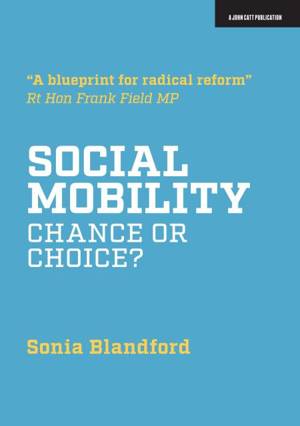
Bedankt voor het vertrouwen het afgelopen jaar! Om jou te bedanken bieden we GRATIS verzending (in België) aan op alles gedurende de hele maand januari.
- Afhalen na 1 uur in een winkel met voorraad
- In januari gratis thuislevering in België
- Ruim aanbod met 7 miljoen producten
Bedankt voor het vertrouwen het afgelopen jaar! Om jou te bedanken bieden we GRATIS verzending (in België) aan op alles gedurende de hele maand januari.
- Afhalen na 1 uur in een winkel met voorraad
- In januari gratis thuislevering in België
- Ruim aanbod met 7 miljoen producten
Zoeken
Omschrijving
Social Mobility: Chance or Choice?, a sequel to `Born to Fail? Social Mobility, a Working Class View' (October 2017), sets out the current chances and choices available for those considered by the establishment to need social mobility. Revisiting mutuality, Sonia Blandford asks whether we care enough as a society by considering the issues, solutions and impact to the education and social issues that push against the chance or choice of social mobility. Citing the views from interviews with education and business leaders, Social Mobility: Chance or Choice? reflects on the changing skillsets and capacities of workers required by employers, business and industry and the inescapable conclusion that the skillsets and capacities will continue to change in ways that are almost impossible for us to predict. In these contexts, we must question whether the traditional acme and 'recognised journey' of educational achievement – maximising university entrance – is still relevant or useful for working-class children and young people and children facing disadvantage. Apprenticeships, at their best, can offer an updated and forward-facing solution to the providing choice for working-class and all children and young people. Despite current policy developments to encourage meaningful apprenticeships, apprenticeship programmes are experiencing challenges. Social Mobility: Chance or Choice? argues that applied learning and work-based learning should be more accessible and available to all children and young people. If we are serious about unleashing the talent of all children and young people, regardless of their background, challenges or needs, we must consider new and innovative approaches to post-14 education. If we are to unleash the potential of all children and young people, the role of Further Education needs to be respected and understood. Quality Further Education and training in partnership with business is a credible answer to social mobility. Further Education is an underused but ideally placed sector to develop meaningful change for working-class young people, providing real chances and choices. Beginning with Leaders - professionals, practitioners, parents or carers, and members of society have a shared responsibility to ensure that all children and young people have a right to chance or choice and support these opportunities. Building a society that is truly inclusive.
Specificaties
Betrokkenen
- Auteur(s):
- Uitgeverij:
Inhoud
- Taal:
- Engels
Eigenschappen
- Productcode (EAN):
- 9781398383357
- Verschijningsdatum:
- 26/09/2019
- Uitvoering:
- E-book
- Beveiligd met:
- Adobe DRM
- Formaat:
- ePub

Alleen bij Standaard Boekhandel
+ 8 punten op je klantenkaart van Standaard Boekhandel
Beoordelingen
We publiceren alleen reviews die voldoen aan de voorwaarden voor reviews. Bekijk onze voorwaarden voor reviews.









